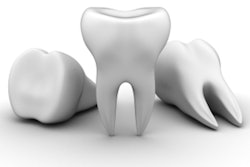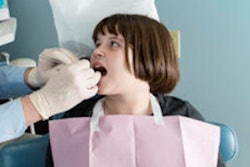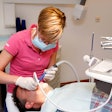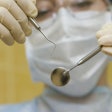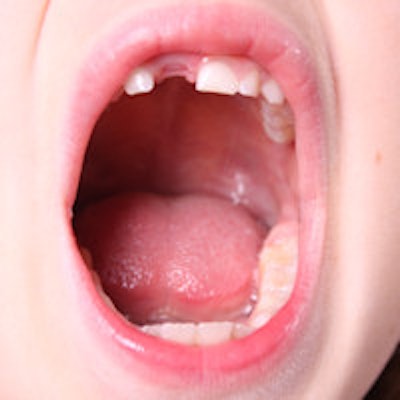
Nurse practitioners can be well-positioned to provide preventive oral healthcare to young children in rural areas or from low socioeconomic households who are unable to see a dentist. However, their oral health knowledge varies. A new study examined what nurse practitioners know about pediatric oral health and what affects this.
Researchers surveyed nurse practitioner members of a pediatric nurse association about their oral health education activities, knowledge of pediatric oral health recommendations, and comfort with delivering pediatric oral healthcare. The investigators found links between the practitioners' participation in oral health continuing education (CE) and their knowledge of pediatric oral care, as well as their comfort with and ability in delivering this care (Journal of Pediatric Health Care, February 20, 2018).
"Dentists and primary care providers need to collaborate rather than work in two separate silos," lead study author Deborah Mattheus, PhD, told DrBicuspid.com in an email interview. "Dental providers, dentists, and dental hygienists can help to provide continuing education to primary care providers, and, in doing so, have the opportunity to be caring for children with fewer caries by the time they reach the dentist."
Mattheus is an assistant professor at the University of Hawaii at Manoa School of Nursing and Dental Hygiene in Honolulu with more than 25 years of experience as a certified pediatric nurse practitioner. She conducts research on oral health outcomes in children and pregnant women.
Need some education
Accessing dental care can be difficult for children living in rural areas or low socioeconomic households since it can be hard to find dentists willing to see young children or provide services to people with low incomes, the authors noted.
“Dentists and primary care providers need to collaborate rather than work in two separate silos.”
However, oral health promotion, including caries risk assessment, dental examination, oral health education, fluoride supplementation, and fluoride varnish application, can be provided by nurse practitioners and physicians in primary care settings with reimbursement through Medicaid in many states. This is supported by major medical and nursing organizations and aligned with primary care guidelines that recommend including oral health screening and education in early infancy and at each well-child visit, according to the authors.
"Primary care providers see children 10 to 12 times in the first two years of life and play a significant role in preventing caries," Mattheus wrote.
She and her colleagues conducted the current study to assess the oral health knowledge and practices of pediatric and family nurse practitioner members of the National Association of Pediatric Nurse Practitioners (NAPNAP) in the U.S.
"Our interest in this topic was based both on a lack of literature on nurse practitioners' oral health knowledge and practice patterns and our interest in improving oral health outcomes for children by engaging more primary care providers in oral health preventive practices," Mattheus wrote.
The researchers emailed an online survey with 10 multiple-choice questions to practicing members of the NAPNAP requesting participation from those who were pediatric or family nurse practitioners.
The questions asked about the practitioner's knowledge of the following pediatric oral health issues:
- Age when toothbrushing should start (correct answer: when the first tooth erupts)
- Age when use of fluoride toothpaste should start (correct answer: 6 to 12 months)
- Age recommended for initial dental visit (correct answer: 6 to 12 months)
- Age when oral fluoride supplements should start (correct answer: 6 to 12 months) and stop (10 to 16 years)
The survey also included questions about whether the practitioners prescribe fluoride oral supplementation and apply fluoride varnish to pediatric patients, their reasons for referring a patient to a dentist, and their comfort level in providing education to parents about oral hygiene and caries prevention and performing caries risk assessments and oral exams.
In addition, the survey had questions about the practitioners' education, the inclusion of oral health in their nursing education, years of practice, and other demographic factors. The study included data from 147 NAPNAP members.
The investigators found a significant association between attendance of an oral health CE course and knowledge of the recommended age at which to start use of fluoride toothpaste (p = 0.021) and have an initial dental visit (p = 0.039), as well as comfort in providing parent education on oral hygiene (p = 0.001), dietary recommendations to reduce caries (p = 0.044), and cariogenic bacteria transmission and risk for caries development (p = 0.007).
Practitioners who had attended a CE oral health course also reported significantly greater comfort than those who hadn't at performing caries risk assessment (p < 0.001) and oral exams (p < 0.001), as well as identifying tooth decay (p < 0.001) and other oral pathology (p = 0.025).
Those who had practiced for longer than five years reported that they had greater comfort in delivering oral health education to parents, conducting oral exams, and identifying pathology, compared with those practicing for a shorter period.
| Nurse practitioners providing optimal answers to select survey questions | |||
| Attended CE courses, n (%) | |||
| Survey question | Total (n = 147) |
Yes (n = 59) |
No (n = 88) |
| At what age do you recommend starting the use of fluoride toothpaste for children? Correct answer: 6 to 12 months | 47 (32.0%) | 26 (44.1%) | 21 (23.9%) |
| At what age do you recommend an initial dental visit for children? Correct answer: Between 6 and 12 months | 35 (23.8%) | 20 (33.9%) | 15 (17.0%) |
| How comfortable are you in providing education to parents on oral hygiene? Answer: Very comfortable | 123 (84.2%) | 56 (96.6%) | 67 (76.1%) |
| How comfortable are you in providing education to parents on the role of oral bacterial transmission and the risk for caries development? Answer: Very comfortable | 92 (63.0%) | 45 (76.3%) | 47 (54.0%) |
| How comfortable are you performing a caries risk assessment on your pediatric patients? Answer: Very comfortable | 67 (45.6%) | 40 (67.8%) | 27 (30.7%) |
| How comfortable are you performing an oral exam on your pediatric patients? Answer: Very comfortable | 94 (63.9%) | 48 (81.4%) | 46 (52.3%) |
"We were surprised with the number of nurse practitioners who are not seeking additional continuing education units despite all of the documentation about oral health outcomes for children," Mattheus told DrBicuspid.com. "Additionally, despite having oral health education in their academic curriculum, there was very little impact on nurse practitioners' current oral health knowledge or comfort."
Back to school
The authors noted the following limitations of their study:
- The sample size was small, so the results may not be generalizable to all nurse practitioners.
- The study had a low response rate.
- The survey was sent out only once.
- It remains unknown whether respondents responded to survey questions from their own knowledge or researched the correct answers.
- Oral health preventive programs, such as water fluoridation, vary by state and may affect practice patterns.
- Reimbursement for oral health promotion practices vary by state and may have affected the ability of nurse practitioners to engage in these activities.
Nonetheless, Mattheus stated that the study's finding of an association between continuing education and oral health knowledge was as she expected.
"Professionals who obtain additional education and training are more knowledgeable on the topic of oral health and comfortable providing oral assessments and education," she concluded.




